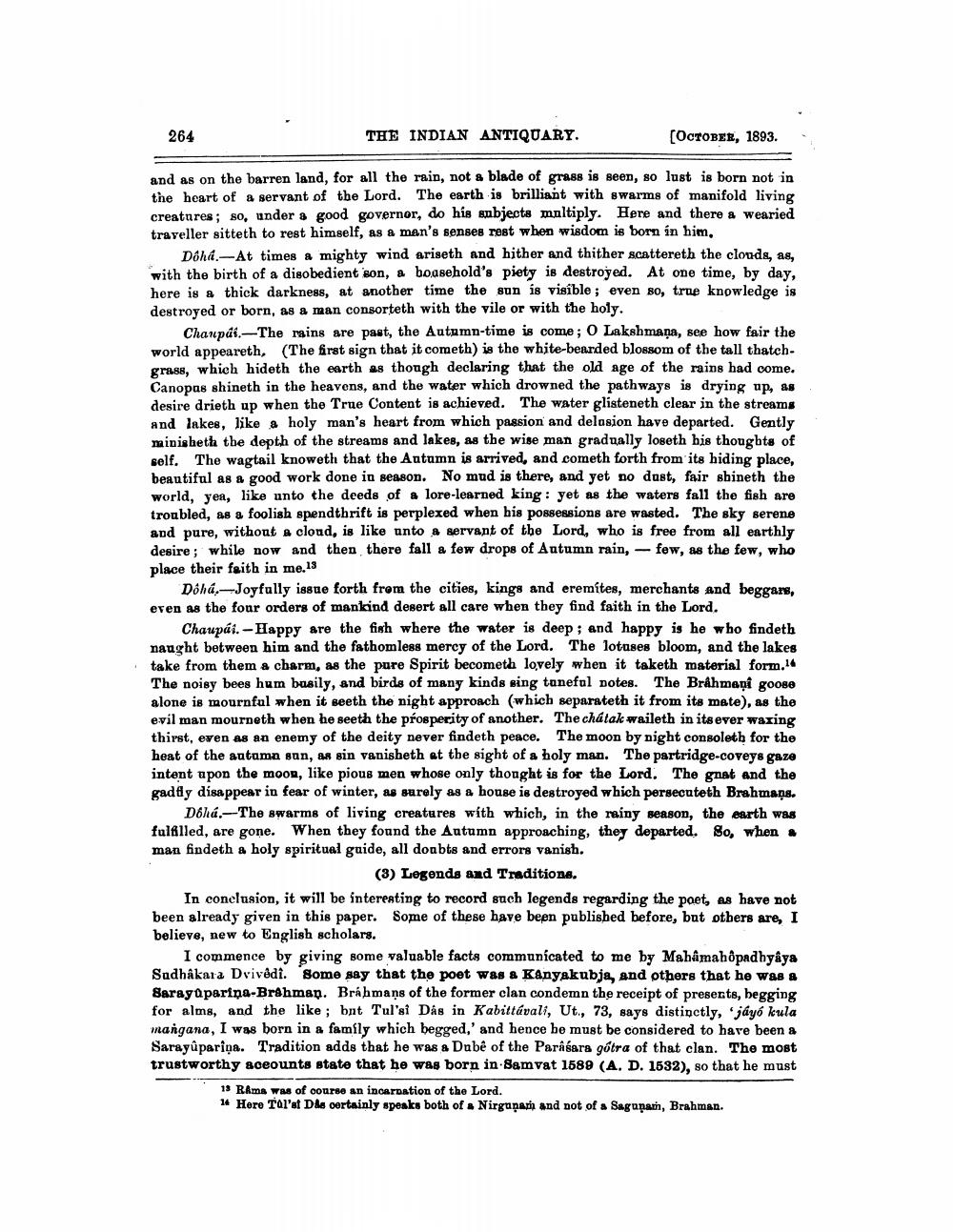________________
264
THE INDIAN ANTIQUARY.
(OCTOBER, 1893.
and as on the barren land, for all the rain, not a blade of grass is seen, so lust is born not in the heart of a servant of the Lord. The earth is brilliant with swarms of manifold living creatures; so, under a good governor, do his subjects multiply. Here and there a wearied traveller sitteth to rest himself, as a man's senses rest when wisdom is born in him,
Doha. At times a mighty wind ariseth and hither and thither scattereth the clouds, as, with the birth of a disobedient son, a boasehold's piety is destroyed. At one time, by day, here is a thick darkness, at another time the sun is visible; even so, true knowledge is destroyed or born, as a man consorteth with the vile or with the holy.
Chaupat.-The rains are past, the Autumn-time is come; O Lakshmana, see how fair the world appeareth, (The first sign that it cometh) is the white-bearded blossom of the tall thatchgrass, which hideth the earth as though declaring that the old age of the rains had come. Canopas shineth in the heavens, and the water which drowned the pathways is drying up, as desire drieth up when the True Content is achieved. The water glisteneth clear in the streams and lakes, like a holy man's heart from which passion and delusion have departed. Gently minisheth the depth of the streams and lakes, as the wise man gradually loseth his thoughts of self. The wagtail knoweth that the Autumn is arrived, and cometh forth from its hiding place, beautiful as a good work done in season. No mud is there, and yet no dust, fair shineth the world, yea, like unto the deeds of a lore-learned king: yet as the waters fall the fish are troubled, as a foolish spendthrift is perplexed when his possessions are wasted. The sky serene and pure, without a cloud, is like unto a servant of the Lord, who is free from all earthly desire; while now and then there fall a few drops of Autumn rain, - few, as the few, who place their faith in me 13
Doha - Joyfully issue forth from the cities, kings and eremítes, merchants and beggars, even as the four orders of mankind desert all care when they find faith in the Lord.
Chaupái. - Happy are the fish where the water is deep; and happy is he who findeth naught between him and the fathomless mercy of the Lord. The lotuses bloom, and the lakes take from them a charm, as the pure Spirit becometh lovely when it taketh material form.4 The noisy bees hum basily, and birds of many kinds sing taneful potes. The Brahmaņi goose alone is mournful when it seeth the night approach (which separateth it from its mate), as the evil man mourneth when he seeth the prosperity of another. The chátak waileth in its ever waxing thirst, even as an enemy of the deity never findeth peace. The moon by night consoleth for the heat of the autumn sun, as sin vanisheth at the sight of a holy man. The partridge-coveys gaze intent upon the moon, like pious men whose only thought is for the Lord. The gnat and the gadily disappear in fear of winter, as surely as a house is destroyed which persecuteth Brahmans.
Dohá.--The swarms of living creatures with which, in the rainy season, the earth was fulflled, are gone. When they found the Autumn approaching, they departed. So, when man findeth a holy spiritual guide, all doubts and errors vanish.
(3) Legends and Traditions, In conclusion, it will be interesting to record such legends regarding the poet, as have not been already given in this paper. Some of these have been published before, but others are, I believe, new to English scholars.
I commence by giving some valuable facts communicated to me by Mahamahopadhyâya Sudhakara Dvivêdi. Some say that the poet was & Kanyakubja, and others that he was & Sarayupariņa-Brahman. Brábmans of the former clan condemn the receipt of preserts, begging for alms, and the like; bnt Tulisi Das in Kabittávali, Ut., 73, says distinctly, jáyó kula mangana, I was born in a family which begged,' and hence be must be considered to have been a Sarayuparina. Tradition adds that he was a Dubé of the Paraśars gótra of that clan. The most trustworthy soeounts state that he was born in Samvat 1589 (A. D. 1532), so that he must
13 Rams was of course an incarnation of the Lord. 14 Here Tai'at Dla certainly speaks both of Nirgunar and not of a Sagunan, Brahman.




